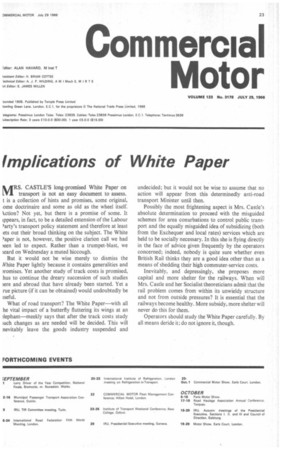Implications of White Paper
Page 25

If you've noticed an error in this article please click here to report it so we can fix it.
MRS. CASTLE'S long-promised White Paper on transport is not an easy document to assess. t is a collection of hints and promises, some original, ome doctrinaire and some as old as the wheel itself. ketion? Not yet, but there is a promise of some. It ippears, in fact, to be a detailed extension of the Labour larty's transport policy statement and therefore at least ets out their broad thinking on the subject. The White 'aper is not, however, the positive clarion call we had )een led to expect. Rather than a trumpet-blast, we ward on Wednesday a muted hiccough.
But it would not be wise merely to dismiss the White Paper lightly because it contains generalities and womises. Yet another study of track costs is promised, hus to continue the dreary succession of such studies iere and abroad that have already been started. Yet a rue picture (if it can be obtained) would undoubtedly be iseful.
What of road transport? The White Paper—with all he vital impact of a butterfly fluttering its wings at an ;lephant—meekly says that after the track costs study ;uch changes as are needed will be decided. This will nevitably leave the goods industry suspended and undecided: but it would not be wise to assume that no action will appear from this determinedly anti-road transport Minister until then.
Possibly the most frightening aspect is Mrs. Castle's absolute determination to proceed with the misguided schemes for area conurbations to control public transport and the equally misguided idea of subsidizing (both from the Exchequer and local rates) services which are held to be socially necessary. In this she is flying directly in the face of advice given frequently by the operators concerned; indeed, nobody is quite sure whether even British Rail thinks they are a good idea other than as a means of shedding their high commuter-service costs.
Inevitably, and depressingly, she proposes more capital and more shelter for the railways. When will Mrs. Castle and her Socialist theoreticians admit that the rail problem comes from within its unwieldy structure and not from outside pressures? It is essential that the railways become healthy. More subsidy, more shelter will never do this for them.
Operators should study the White Paper carefully. By all means deride it; do not ignore it, though.
































































































































































